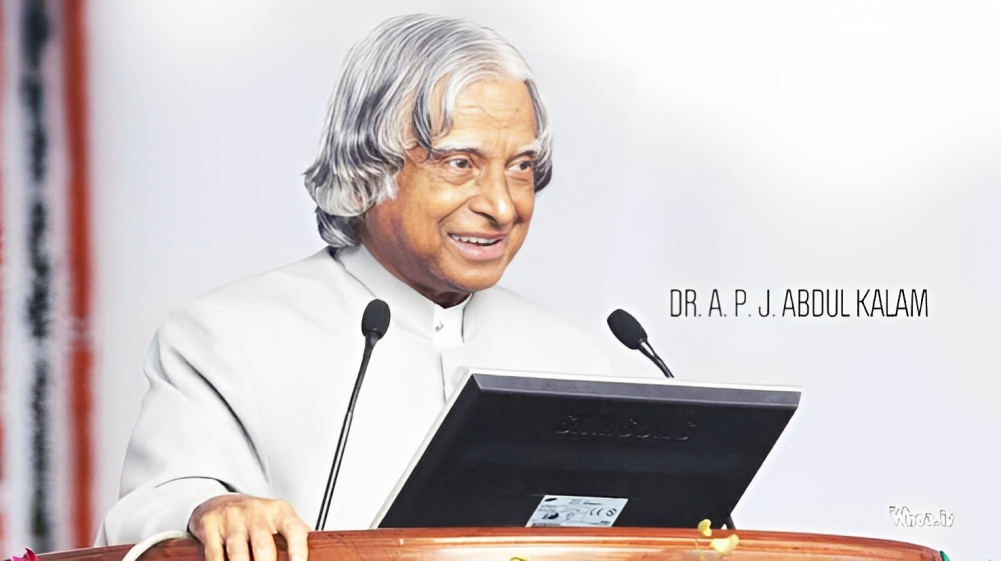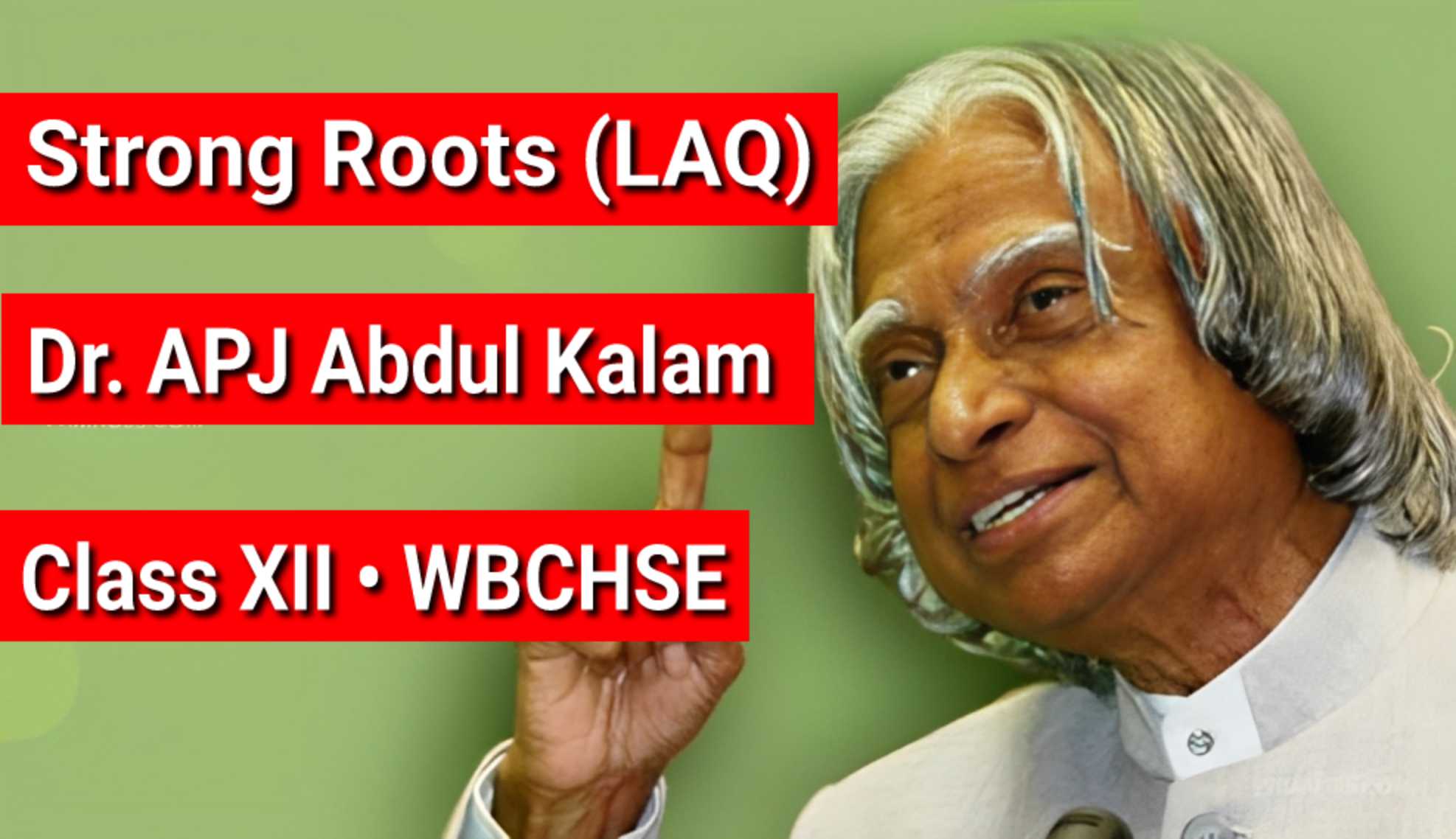
Strong Roots Long Questions and Answers
Strong Roots Questions and Answers • Strong Roots Question and Answer
Strong Roots LAQ
Strong Roots by APJ Abdul Kalam
(1) “I normally ate with my mother” – Who ate with his mother? Name his mother? Where did he eat with his mother? What did he eat with his mother? [1+1+1+3] [HS 2018, 2022]
Ans. Dr. APJ Abdul Kalam, the author of the “Strong Roots”, ate with his mother.
The name of his mother is Ashiamma.
He ate with his mother sitting on the floor of the kitchen.
He ate rice, aromatic sambar, a variety of homemade pickles, and a dollop of fresh coconut chutney with his mother.
(2) What remained the routine for Abdul Kalam’s father even when he was in his late sixties? What does Abdul Kalam say about his emulation of his father? [3+3] [HS 2016]
Ans. Abdul Kalam’s father maintained a strict routine life up to his late sixties. He used to start his day before dawn by reading the namaz at 4 am. Then he used to walk four miles to reach their coconut grove and returned home with a dozen coconuts on his shoulder. Then he took his breakfast.
Kalam has tried to emulate his father in his world of science and technology. He has tried to understand the fundamental truths revealed to him by his father. He is sure that there exists a divine power that can lift a person from misery and failure to his/her true place.
(3) “Why don’t you say this to the people who come to you?” – Who says this and to whom? What is referred to by the word ‘this’? Why do the people come to the person spoken to? [2+3+1] [HS 2015]
Ans. Dr. APJ Abdul Kalam says this to his father Jainulabdeen in his autobiography “Strong Roots.”
APJ Abdul Kalam used the word “this” to refer to “a spiritual concept” that his father had stated. Kalam’s father said that we shouldn’t be afraid of difficulties, suffering, and problems because adversity always presents opportunities for introspection or self-analysis. Instead, we should try to understand the relevance of suffering.
Many people come to Kalam’s father to get spiritual guidance from him. His father tried to propitiate the evil spirits with prayer and offerings whenever they were in a difficult situation.
(4) “The people of different religions would be sitting outside waiting for him” – Who is referred to as ‘him’? Where did the people wait? Why did they wait there? What would happen thereafter? [1+1+2+2] [HS 2020]
Ans. In “Strong Roots”, ‘him’ is referred to Dr APJ Abdul Kalam’s father, Jainulabdeen.
The people waited for him outside the local mosque.
They waited for him for spiritual help and guidance. They offered bowls of water to him and he used to sanctify the water by dipping his fingertips and chanting a prayer. They took this water home and it was used to cure the invalids.
If the invalids were cured, they visited his father to thank him. But his father smiled and told them to thank Allah, the merciful.
(5) “Our locality was predominantly Muslim” – Who is the speaker? How does the speaker describe the locality? What picture of communal harmony do you find in the description? [1+3+2] [HS 2017]
Ans. The writer of the autobiography “Strong Roots,” Dr. APJ Abdul Kalam is the speaker here.
Abdul Kalam lived in Rameshwaram, an island town in Madras state. The locality where he lived was predominantly Muslim. Many Hindu families lived there amicably with their Muslim neighbours. There was a great Shiva temple near his house which made Rmeswaram very famous to pilgrims. There was also a very old mosque in their locality where Kalam’s father took him for evening prayer.
In “Strong Roots” we find a great picture of communal harmony. The hindus and the muslims lived together amicably. The well-known Shiva temple and the old mosque were situated in the same locality. Pakshi Lakshmana Sastry, the high prist of the Shiva temple and Kalam’s father were close friends and discussed spiritual matters although belonged to different religions. So, there was no religious prejudice.
(6) “His answer filled me with a strange energy and enthusiasm” – Who is the speaker? Whose answer is being referred to here? What was the answer? [1+1+4] [HS 2019]
Ans. The writer of the autobiography “Strong Roots,” Dr. APJ Abdul Kalam is the speaker here.
The answer of Kalam’s father is referred to here.
According to Kalam’s father, whenever human beings find themselves alone or in trouble, they looked for someone to help them. Kalam’s father acted as a mediator. He tried to propitiate the evil spirits with prayer and offerings. However, he accepted that this was not the correct approach. One should realize the relevance of his/her sufferings to make a way out.
(7) What did Kalam’s father tell him about the relevance of prayers? Or, What was Kalam’s father’s response to his son’s query about prayers and spirituality? [6]
Ans. When Kalam was a young boy, he had seen people saying prayers at the old mosque. He couldn’t understand the meaning of the Arabic prayers, but he was sure that they reached God. When he was old enough, he asked his father about the relevance of the prayers. According to Kalam’s father, there was nothing mysterious about prayers. Prayer made possible a communion of the spirit between people. He also said that when a person prays, he/she transcends his/her body and becomes a part of the cosmos which knows no division of wealth, age, caste or creed.
(8) “One of the most vivid memories on my early childhood is of the two men…” – Whose childhood memories are referred to? Who are the two men? What was their topic of discussion? What answer did the narrator get regarding his question on prayer? [1+2+1+2] [HS 2023]
Ans. The childhood memories of the narrator of “Strong Roots”, APJ Abdul Kalam are referred to here.
The two men are Pakshi Lakshmana Shastri, the high priest of Rameshwaram temple and Kalam’s father Jainulabdeen.
The topic of their discussion was spiritual matters.
When Kalam asked his father about the relevance of prayer, his father told him that prayer made possible a communion of the spirit between people. He also said that when a person prays, he/she transcends his/her body and becomes a part of the cosmos which knows no division of wealth, age, caste or creed.
*****
Read More:
Strong Roots SAQ Short Answer Type Questions
Strong Roots MCQ Multiple Choice Questions and Answers
WBCHSE Class 12 Chapter Wise Questions and Answers from PROSE
WBCHSE Class 12 Chapter Wise Questions and Answers from POETRY

